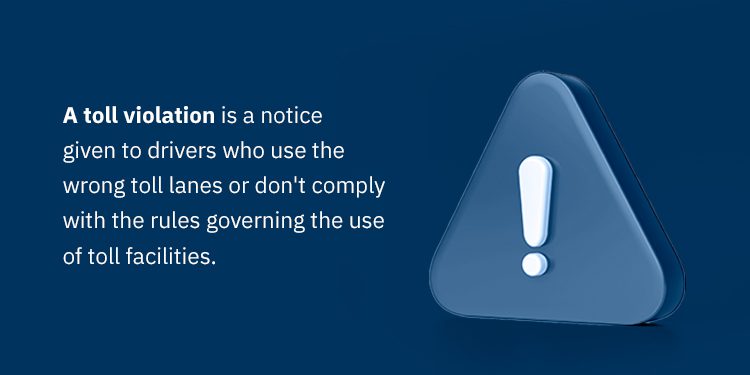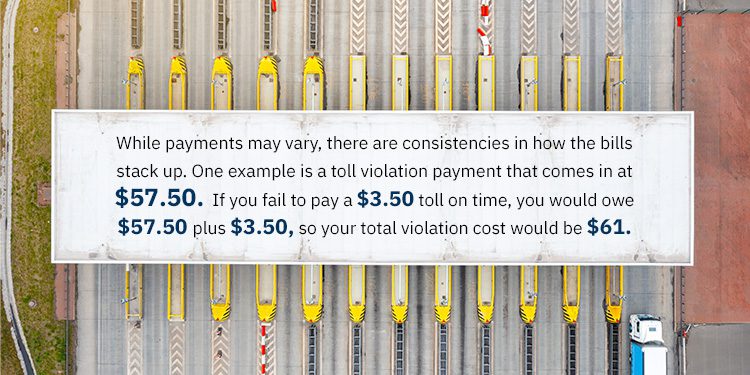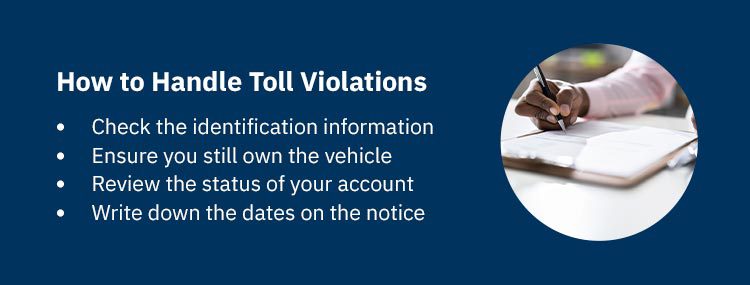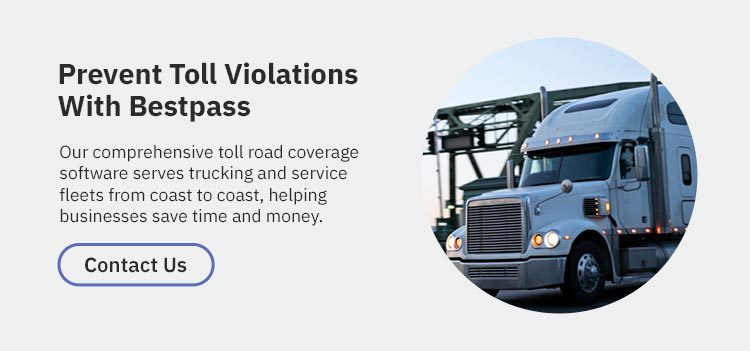
What Are Toll Violations?
Jump to: What are Toll Violations? | What Causes a Toll Violation? | How Much Is a Toll Violation? | How to Handle Toll Violations | How to Dispute Toll Violations | How to Avoid Toll Violations
As a fleet manager or owner-operator, various duties take up your time as you try to manage your fleet vehicles efficiently, drivers and customer service. While your business and fleet grow, you may notice that managing tolls and violations will become challenging. The more vehicles you have on the road, the more likely you’ll miss a toll fee in the mail and end up with an inconvenient fine.
Eventually, you can end up spending more time handling toll disputes and paying fees than focusing on your essential business processes. Instead of dealing with these frustrations, consider how a toll management solution can help take the burden of tolls off of your shoulders and allow you to do more for your core operations.
Below, we’ll discuss some common issues with tolls and how you can dispute and avoid violations.

What Is a Toll Violation?
A toll violation is a notice given to drivers who use the wrong toll lanes or don’t comply with the rules governing the use of toll facilities. Drivers or fleet owners who don’t pay the proper toll fee on time or at all will receive a violation notice for failing to pay the fees.
Many drivers and fleet managers unexpectedly receive toll violations through the mail because they don’t realize they passed through a toll incorrectly or there was an issue with their transponder. Additionally, toll violations can get lost in the mail or be put aside where they go unnoticed, leading to costly consequences.
The vehicle owner and operator of the vehicle are jointly responsible for the toll violation if it’s not paid. As a fleet manager, the violation notice will likely be sent to you if your name is on the vehicle registration. This notice will require payment for the toll due and an administrative fee. It’ll also note the period of time in which you can submit or dispute the violation.
If you fail to pay or respond to the instructions on the violation notice, you may incur additional fees or a suspended vehicle registration. If the violation continues to go unanswered, it can have severe consequences on your fleet’s car insurance and even lead to the suspension of your or your operator’s driver’s license.
What Causes a Toll Violation?
Though you may receive a violation notice for simply forgetting to pay your tolls or going through the wrong lanes, there are other causes of toll violations. Depending on how many fleet vehicles you own or how far your business delivers goods, your drivers may run into plenty of chances to incur toll violations, sometimes without their knowledge.
Some causes of toll violations include:
- Using a toll lane without a valid transponder
- Using an in-state transponder for an out-of-state toll
- Entering an express or toll lane improperly
- Using a toll lane with insufficient funds in your transponder account
- Accessing a toll lane in a vehicle other than the registered fleet vehicle on the toll pass
- Using a deactivated pass
- Using a toll lane with an unregistered vehicle
- Using a transponder that has not been mounted properly
While these are general guidelines your drivers shouldn’t break, every state has different toll rules. Knowing what could cause a toll violation in your state and any locations where your fleet transports goods is critical. If you have a larger fleet, it can be more difficult to stay on top of toll payments and ensure you pay violations promptly.

How Much Is a Toll Road Violation?
While payments may vary, there are consistencies in how the bills stack up. One example is a toll violation payment that comes in at $57.50. This does not include the initial toll amount due. If you fail to pay a $3.50 toll on time, you would owe $57.50 plus $3.50, so your total violation cost would be $61. Weekend toll rates will apply if necessary.
The cost of a toll violation increases if you miss your first violation notice. A second violation notice will be mailed to you if you do not respond to the first. This second notice will cost an additional $42.50. If you miss this one as well, the DMV might put a hold on your vehicle’s registration.
A violation will be issued if your toll violation has not been paid within five days after it was issued. A separate violation will apply for each unpaid notice.
This breakdown of a balance will help you understand what you are paying:
- Amount due: This is the total amount of money owed to pay for the violation.
- Previous balance: This is the previous balance reflected on your last bill. A negative number reflects any unpaid tolls that are carried over from your previous bill. A positive number means you have money in your account and nothing is due from your last bill.
- Payments: This value reflects any payments, reversals, refunds or credit available since your last payment.
- Tolls: Here, you see the total amount owed solely in tolls since your last payment.
- Other charges: This is where miscellaneous charges are listed, like pass purchases.
- Fees and civil penalties: There is a late fee that must be paid should you not address your violation promptly. Your bill will include the late fee and another list of civil penalty charges levied since your previous bill. The fees and rates charged for violations and civil penalties vary depending on the state in which the violation took place.
- Ending balance: This number is usually the same as the amount due, as it reflects all the previously listed payments. If it is listed as a negative number, it means nothing is owed.
The “New Activity” section of your bill includes a detailed breakdown of all new payments made or due since your last bill. The activity listed includes toll payments, toll charges, fees, penalties, pass purchases and other related information. The listed activities are sorted by date, with the newest additions at the top and the oldest relevant activity at the bottom.

How to Handle Toll Violations
If you receive a toll violation addressed to you or one of your drivers, here are some steps you can take to manage the violation and ensure it’s been rightfully issued to you:
- Check the identification information: Ensure the correct name and license tag number. Check the license tag image to see if it’s blurry — this can lead to clerical errors and cause a state’s Department of Motor Vehicles (DMV) to send a toll violation notice to the wrong address.
- Ensure you still own the vehicle: If you’ve recently sold one of your fleet vehicles to replace it — or if it’s been stolen — you likely won’t be liable for the toll charges.
- Review your account status: Check your accounts with the tolling authorities to ensure your transponder or pass is active and current. If you have a prepaid toll account, check if there’s enough money in the account to cover your driver’s tolls.
- Write down the dates on the notice: Some toll violation notices give you as little as two weeks to pay or dispute the charges. These deadlines differ in every state, so it’s critical to read the notice carefully and mark your calendar to ensure you take action well before the deadline.
How to Dispute a Toll Violation
If you’ve followed the steps above and determined your toll violation is incorrect or addressed to the wrong person, follow these steps to submit a toll violation dispute:
- Call the customer service number: The toll authority that sent you the notice should have a website or toll-free number to call and register a dispute. Be sure to call or go online promptly after receiving the notice so you can rectify the issue as soon as possible.
- Download and fill out the appropriate form: If you need to submit a dispute online, download the correct form and fill it out. Some forms may have a list of reasons you can choose to explain why you’re disputing the violation. Others ask for a written explanation. Be sure to include any evidence that will help your dispute go through.
- Submit your dispute form: You may be able to submit your dispute by mail, fax, email or over the phone. Check with the toll authority and ensure you choose the correct contact/ method.
Learn more on disputing toll violations here.
How to Avoid Toll Violations
Here are some ways your fleet drivers can avoid toll violations:
- Know the route: Your drivers should be aware if there’s a toll on the way to their destinations and know the benefits of their toll pass, such as the amount in their pre-paid account.
- Be prepared for a change of plans: If your drivers need to change their intended routes or destinations due to traffic or an accident that creates a detour, they must be prepared to pass new tolls and use them correctly.
- Pay attention to toll signs: Talk with the operators of your fleet vehicles and ensure they know how tolls work. Make sure they use the correct lanes by reading the signs at the toll plaza to avoid violations.
- Use a toll management solution: One of the best ways to avoid toll violations is to use a toll management software, like Bestpass, that manages toll violations and gives you one bill and one point of contact/ with tolling authorities to make it easier to catch inconsistencies or issues with tolling.
Manage Your Toll Payments With Bestpass Solutions
Simplify your truck fleet’s toll payments with our Toll Management payment solution — our sophisticated tools enable you to track payments by truck plate number and much more. With our highly trained customer service team and commercial toll experts, we’re here to answer your questions whenever you need us. We also provide you with a powerful web portal that provides advanced analytics tools, business intelligence and other tools to help you proactively manage your toll payments and gain insights into the data collected on your fleet.
To find out more about the many solutions, products and services we can offer you, contact/ our team today. You can also call us at 888-410-9696 for prompt service and answers on how we can support you in toll violation disputes.


